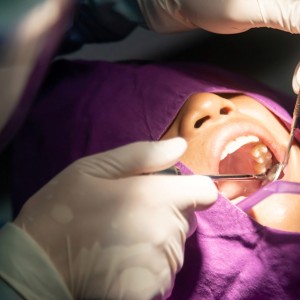
DOACs: risk of bleeding during oral surgery
Alessandra Abbà
The number of patients under treatment with oral anticoagulant and antiplatelet drugs - used for primary and secondary prevention of venous thromboembolic diseases - has grown. There are two types of oral anticoagulant treatment: vitamin K antagonists (e.g. warfarin and coumarin) and DOACs-direct oral anticoagulant (e.g. dabigatran, rivaroxaban, apixaban, edoxaban). In particular the latter, which have been object of research and study in recent years, have a wide therapeutic window and no need for regular and systematic monitoring of INR. The INR level is important to determine how well the anticoagulant treatment is preventing blood clots.
Patients being treated with oral anticoagulant are at higher risk for bleeding when undergoing oral surgery or dental extractions. Within the desired range of the INR level, a person has both the least risk of blood clotting complications and the least risk of excessive bleeding. However, there is not enough scientific data about the protocol to apply in these patients on DOACs undergoing dental treatment. Thus is necessary to evaluate the potential bleeding risk of these drugs, the possibility of thromboembolic events occurring if they are withdrawn or the need to change to heparin previously.
Material and methods:
in this review a comprehensive search of the PubMed, Scopus and ISI Web of Science databases was conducted in order to identify studies evaluating the relationship between DOACs and dental procedures. All kind of articles (rando-mized clinical trials, cohort studies, case-control studies, case series and case reports), performed in adult patients under treatment with any kind of DOACs drug who underwent a dental procedure that implied any kind of bleeding, were considered.
Results:
11 studies were judged to be of interest on the basis of the criteria selected and included in the review. Between these, 2 are randomized clinical trials, 3 are prospective studies, 3 are retrospective studies, 2 are case series and 1 is a case report.
Conclusions:
There is no consensus about the protocol to follow in patients in treatment with DOACswho need a dental procedure or bleeding. However, all the authors agree that it is necessary to individualize each case evaluating the difficulty of the procedure and the related risk of bleeding with the consensus between the dentist and the patient´s responsible physician. However DOACs are safe drugs in terms of bleeding. The possible postoperative bleeding complications are manageable with conventional haemostasis measurements. The bridging approach with heparin does not seem to be recommended.
For additional information: Direct oral anticoagulants and its implications in dentistry. A review of literature
 Related articles
Related articles
Oral surgery 22 September 2025
Minor oral surgical procedures in patients on oral anticoagulants—a controlled study
Patients on therapeutic anticoagulation are at risk of bleeding from minor oral surgical sites.
Oral surgery 27 October 2025
The authors assessed the incidence of postoperative bleeding in patients who were highly anticoagulated and in patients who underwent extensive oral surgical procedures and who continued using oral...
Oral surgery 17 January 2025
Minor oral surgery or dental extractions (oral or dental procedures) are widely performed and can be complicated by hazardous oral bleeding, especially in people with an inherited bleeding disorder...
Orthodontics 04 July 2023
Does an app improve oral hygiene in patients undergoing orthodontic treatment?
Researchers enrolled patients ages 14 to 19 years old who started their orthodontic treatment using fixed appliances at a clinic in San Paulo, Brazil. Only patients who had smartphones were included...
Dr. Jason Choorapuzha, an Oakmont, Pennsylvania-based dentist, announced on June 16 that he completed advanced laser training with DEKA, a leading manufacturer of innovative laser technology.
 Read more
Read more
Restorative dentistry 13 February 2026
Integrating Laser Technology with CAD/CAM for Advanced Smile Design in Dentistry
This study aimed to evaluate the effectiveness of integrating laser treatment with CAD/CAM systems in restoring dental function and aesthetics in a 35-year-old male patient suffering from bruxism.
Editorials 13 February 2026
The SRG is UFCD’s student‑run chapter of the American Association for Dental, Oral and Craniofacial Research, or AADOCR.
Products 13 February 2026
Parkview Dental, a leading Dental Support Organization committed to providing comprehensive management services to dental practices, announced the appointment of Lisa Burris as its new Director of...
News 13 February 2026
DentaQuest, part of Sun Life U.S., recently announced the appointment of Dr. Ronke Ogunbameru as dental director for Texas, where the organization covers more than 1.4 million Medicaid and CHIP...
News 13 February 2026
Unlock CE Credits by Reading One Move Makes All the Difference
Dental professionals can now earn 4 hours of continuing education credit by reading One Move Makes All the Difference by Martin R. Mendelson, DDS, FIADFE, CPC. Dr. Mendelson and Metamorphosis...















